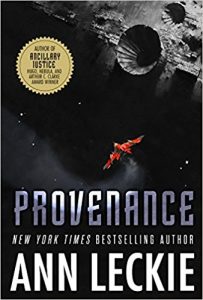Russell Letson reviews Provenance by Ann Leckie
Provenance, Ann Leckie (Orbit, 978-0-316-38867-2, $26.00, 393pp, hc) September 2017. Cover by John Harris.
 Ann Leckie’s Provenance takes place in the same far future as her Ancillary novels and shares some of that trilogy’s underlying issues: legal versus actual identity and citizenship status; the burdens, benefits, and oddities of cultural artifice or convention; the ways that polities can be subverted or perverted. But there are no ancillaries or emerging AIs here. The main setting, Hwae System, is a healthy (and safe) distance from Radch space, and while the novel’s plot machineries do eventually involve interstellar tensions and rivalries, those are not the first matters of concern. Instead, our closely controlled viewpoint character, Ingray Aughskold, worries about how to pull off a scheme that will gain the respect of her foster-mother and offer some advantage in her rivalry with her slick, self-assured foster-brother Danach, who everyone assumes will be named heir and thus eventual head of the family and furtherer of its political ambitions.
Ann Leckie’s Provenance takes place in the same far future as her Ancillary novels and shares some of that trilogy’s underlying issues: legal versus actual identity and citizenship status; the burdens, benefits, and oddities of cultural artifice or convention; the ways that polities can be subverted or perverted. But there are no ancillaries or emerging AIs here. The main setting, Hwae System, is a healthy (and safe) distance from Radch space, and while the novel’s plot machineries do eventually involve interstellar tensions and rivalries, those are not the first matters of concern. Instead, our closely controlled viewpoint character, Ingray Aughskold, worries about how to pull off a scheme that will gain the respect of her foster-mother and offer some advantage in her rivalry with her slick, self-assured foster-brother Danach, who everyone assumes will be named heir and thus eventual head of the family and furtherer of its political ambitions.
Ingray has traveled to the neighboring Tyr System to illegally extract from “Compassionate Removal” (a euphemism for a familiar kind of exile-imprisonment) a Hwaean criminal who might provide information that will embarrass a rival family. When the prisoner appears to be someone else altogether, Ingray is forced to improvise her way out of a sticky situation: accompanying a person with an uncertain legal status aboard a homeward-bound ship whose captain has citizenship-status problems of his own. Nothing is what it seems at first, though, and the story offers fake identities, disguises, hidden agendas, family secrets, shapeshifting bio mechs, political and sibling rivalries, a nice murder mystery, alien diplomacy, and various puzzles to be solved and tight spots to be gotten out of.
The cast’s central trio are all marginalized in some way. Starship Captain Uisine, who becomes an unlikely ally, is an exile (or escapee?) from the homeworld of the hermetic, alien Geck. The sprung criminal who accepts the fake identity of “Garal Ket” seems to have no legal status or safe haven anywhere. Ingray in particular feels adrift, an unfavored adopted child suffering from imposter syndrome, despite what should be a safe position in the ranks of her family. Although she has done “competent” staff work for her mother’s organization, she
had always felt like she didn’t belong…. that Ingray would never have the kind of daring brilliance [her mother] Netano Aughskold prized…. [C]ompetent was not brilliant. Brilliant was taking all that knowledge and those contacts and finding a way to use it to advantage. To come up with a plan, a scheme….
Ingray will be required to devise a number of plans and schemes, and her talents – of which she is unaware and which it is the job of the story to unfold and develop – are rooted in her understanding of individuals and her urge to deal with the here-and-now, even as she comes to grasp larger contexts and conflicts.
Accordingly, much of the novel turns on Ingray’s encounters with cultures and situations that she needs to understand (including aspects of her own), and I kept thinking of Jack Vance’s idiosyncratic societies. The opening sequences, for example, reveal Tyr to be a meticulously rule-following, contract-based commercial society: make a deal (almost any deal), keep the deal, expect minimal courtesies and no unpaid extras. Similarly (though for different reasons), Ingray finds in Captain Uisine a scrupulous navigator of rules and regulations – not that he won’t stretch a point, or the truth, when he needs to. Later she has to cope with more strange humans (including a Radchaai diplomat) and representatives of alien species with opaque values and urges.
All the while, thanks to the book’s tight viewpoint control, the reader is challenged to assemble a picture of the history-saturated society of Hwae, which obsesses over its past in the form of “vestiges” – documents, souvenirs, stray bits and bobs of domestic life, or even pieces of wreckage that memorialize important events and relationships for individuals, families, or the entire planetary society: the physical signs of historical connection, legitimacy, and status. Stolen family vestiges and the scandal that accompanied their disappearance were at the heart of Ingray’s initial plan, and larger events revolve around possession of the contents of Hwae’s System Lareum, which contains objects that “had been touched by certain people, actually, physically been there when pivotal, system-shaking events had happened, events that had led to the founding of Hwae, that had made all of them who they were today.” These include the document that established Hwae’s independence from the neighboring Omkem Federacy, the Rejection of Further Obligations, a metaphorical firearm that is not allowed to remain a mere decoration over the novel’s mantelpiece.
Vestiges are only one manifestation of the novel’s fascination with matters of identity, legitimacy, and belonging. Who has jurisdiction over the criminal who accepts the fake identity of “Garal Ket”? Does it matter that Captain Uisine’s vessel is stolen if the papers documenting his ownership are probably (but unprovably) forgeries? In fact, exactly what is Uisine’s citizenship status? How might an examination of the composition of the “ruin glass” that is part of Hwae’s geology contribute to the Omkem Federacy’s program of re-establishing its hegemony over Hwae? And in the background, questions about who or what qualifies as a “significant” species under the treaty that keeps the dreaded, potent, inscrutable Presger from treating everyone else as vermin.
There’s a case to be made that despite the interstellar-empire-and-space-opera universe that hosts these stories, Leckie’s strong suit is the smaller-scale dramas that take place against that background. Ingray’s motives start out family based, and her original scheme is relatively modest in scope, even if her actions gradually involve larger matters. Much depends on her understanding of what drives the various beings she encounters and her gradual recognition of what she can do in the face of a particular situation. That is not to say that the big-picture elements or the defamiliarizing effects of this milieu’s range of gender roles and identities, family relationships, local folkways, and general exotica don’t saturate every corner of the story. Jack Vance, remember, and Ursula K. Le Guin, and Eleanor Arnason, and C.J. Cherryh, and Walter Jon Williams, and all the other writers who have expanded our notions of what might constitute humanity or normality in a universe of endless possibility. If I had to engage in one of those Facebookish literary games, I might suggest that Provenance makes me think of Jane Austen in the Ekumen, or the Oikumene, or even the Culture. Leckie juxtaposes a range of scales – personal, familial, world-wide, cross-cultural, deep-historical – and reminds us that those who experience or even affect great or terrible or world-changing events are also living interior lives as significant and exciting as the larger dramas.
Russell Letson, Contributing Editor, is a not-quite-retired freelance writer living in St. Cloud, Minnesota. He has been loitering around the SF world since childhood and been writing about it since his long-ago grad school days. In between, he published a good bit of business-technology and music journalism. He is still working on a book about Hawaiian slack key guitar.
This review and more like it in the October 2017 issue of Locus.







